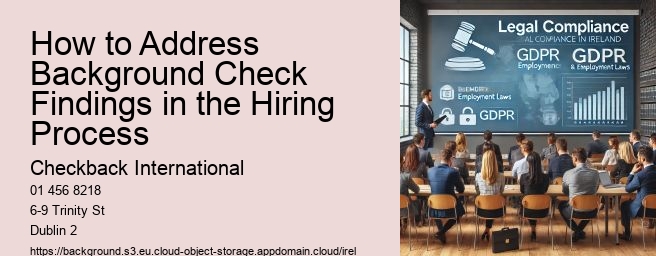

International candidates can undergo vetting for PSA compliance when they provide required documents that match domestic standards and fulfill necessary prerequisites.
Criminal record verification is part of the PSA vetting process in Ireland. Applicants undergo screening through the National Police Service (An Garda Sìochána) and international law enforcement agencies when candidates have lived abroad. The process requires submitting personal information and documentation to verify the absence of disqualifying criminal convictions.
Organizations like Checkback International Services and Executive Vetting Solutions conduct thorough reviews of potential employees' histories. These checks examine court records, bankruptcy information, and European criminal records, providing employers with comprehensive information about candidates' backgrounds.
Background checks play a major role in Ireland's business operations.
What if Some Information Is Missing or Not Verifiable During the Vetting?
Past failed vetting checks can affect later background checks based on the specific rules and requirements being used. Each review looks at both old screening results and new details submitted during the checking process.
Quick processing supports faster onboarding and improves organizational operations, benefiting project timelines and business commitments in the market.
Steps in the PSA Background Check Process
Turnaround Times and Speed of Service

Users often point out the helpfulness of service teams and their quick response to questions. Such positive feedback shows how background checks help companies in Ireland maintain safety and reduce hiring risks.
The checks must match job requirements without affecting candidate privacy rights.
2.Management of multi-level security clearances and approval processes


Criminal Record Verification Process
If a candidate disagrees with their background check results, they can file a formal dispute and provide supporting documents. The background screening company will review the contested information and make updates based on any new materials submitted.
If a candidate declines pre-employment screening, organizations can withdraw their job offer or end the hiring process.

2.Employment History Check: This validates a person's previous work experience, roles, and job performance.
PSA Vetting Requirements for Security Personnel
Organizations can conduct background checks on remote workers located outside Ireland while following data protection and employment regulations of both Ireland and the worker's home country.
Privacy Laws and Employee Background Checks in Ireland: What Employers Must Know

While employers use standard screenings like criminal records and employment history, they also focus on remote-specific areas.
Options and Components in Consumer Credit Reports
Frequently Asked Questions
A background check in Ireland involves reviewing a person's criminal, financial, or personal records to assess their suitability for a role or position.
The duration can vary but typically takes between 1-2 weeks, depending on the type and complexity of the check.
Garda vetting is a specific type of background check required in Ireland for individuals working with children or vulnerable adults, involving checks against police records.
Yes, you must obtain consent from the individual before conducting any background checks in Ireland.
Not for all employees, but certain sectors such as healthcare and education may require comprehensive checks.
It includes checking for any criminal convictions or offences recorded against the individual.
Yes, individuals can request their own background checks in Ireland for personal review or to prepare for employment screenings.
Skipping background checks can lead to hiring unsuitable candidates, which may result in legal and reputational risks.
Yes, police clearance is a general criminal record check, while Garda vetting is specific to roles involving vulnerable groups and includes more detailed investigations.
You can request transcripts or degrees directly from educational institutions or use third-party services that specialize in educational verifications.
Information about spent convictions, certain types of personal data, and other protected characteristics under GDPR is off-limits unless specifically relevant and lawful to access.
International checks may involve additional complexities such as different laws, languages, and longer processing times.
No, background checks do not affect your credit score as they do not involve a credit inquiry that would impact the score.
Best practices include securing data in compliance with GDPR, limiting access to authorized personnel, and ensuring data is stored for only as long as necessary.
It depends on the industry and role, but typically every 2-3 years or when significant changes occur in the individual’s role or responsibility.
While not specific by law, many IT positions require checks due to access to sensitive or proprietary information.
GDPR regulates the processing of personal data, ensuring that background checks are conducted in a lawful, fair, and transparent manner.
Yes, but it must be done lawfully and with the individual’s consent, considering the relevance to the role.
Penalties can include fines, legal actions, and reputational damage, depending on the severity of the non-compliance.
Remote work has increased the importance of thorough background checks, especially for those in positions of trust or handling sensitive data.
Best practices include conducting similar checks as for permanent staff, especially if they have access to sensitive or critical areas.
Ensuring fairness involves following consistent procedures, obtaining consent, and allowing candidates to dispute inaccuracies.
Yes, it’s recommended to tailor background checks based on the specific risks and requirements of each position.
Signs include transparency about services, compliance with legal standards, positive reviews, and strong data protection practices.
Handling involves assessing the relevance to the job, discussing findings with the candidate, and considering legal and ethical implications.